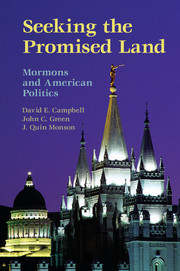Book contents
5 - A Politically Peculiar People
Published online by Cambridge University Press: 05 August 2014
Summary
On March 8, 2013, Dieter F. Uchtdorf, Second Counselor in the First Presidency of the LDS Church, joined a group of religious leaders in a meeting with President Barack Obama to discuss immigration reform. Upon leaving the meeting, Uchtdorf said that what the president said “was totally in line with our values.” While not endorsing any specific proposal, the LDS Church also issued a statement supportive of immigration reform that sounded a lot more like the platform of the Democratic than the Republican Party. “Public officials should create and administer laws that reflect the best of our aspiration as a just and caring society. Such laws will properly balance love for neighbors, family cohesion, and the observance of just and enforceable laws” (Canham 2013).
Some observers might be surprised at the common ground between LDS leaders and the Obama administration on immigration. As we have seen in Chapter 4, Mormons are more heavily Republican than any other religious group. Furthermore, Mitt Romney, President Obama’s opponent in the 2012 election, is a devout Mormon who took a hard line on immigration, even endorsing a policy of “self-deportation” for undocumented immigrants. Yet Uchtdorf, and the LDS leadership more generally, are more in step with Mormons’ attitudes on immigration than Romney – notwithstanding Mormons’ overall conservatism and support of the Republican Party.
- Type
- Chapter
- Information
- Seeking the Promised LandMormons and American Politics, pp. 103 - 131Publisher: Cambridge University PressPrint publication year: 2014

